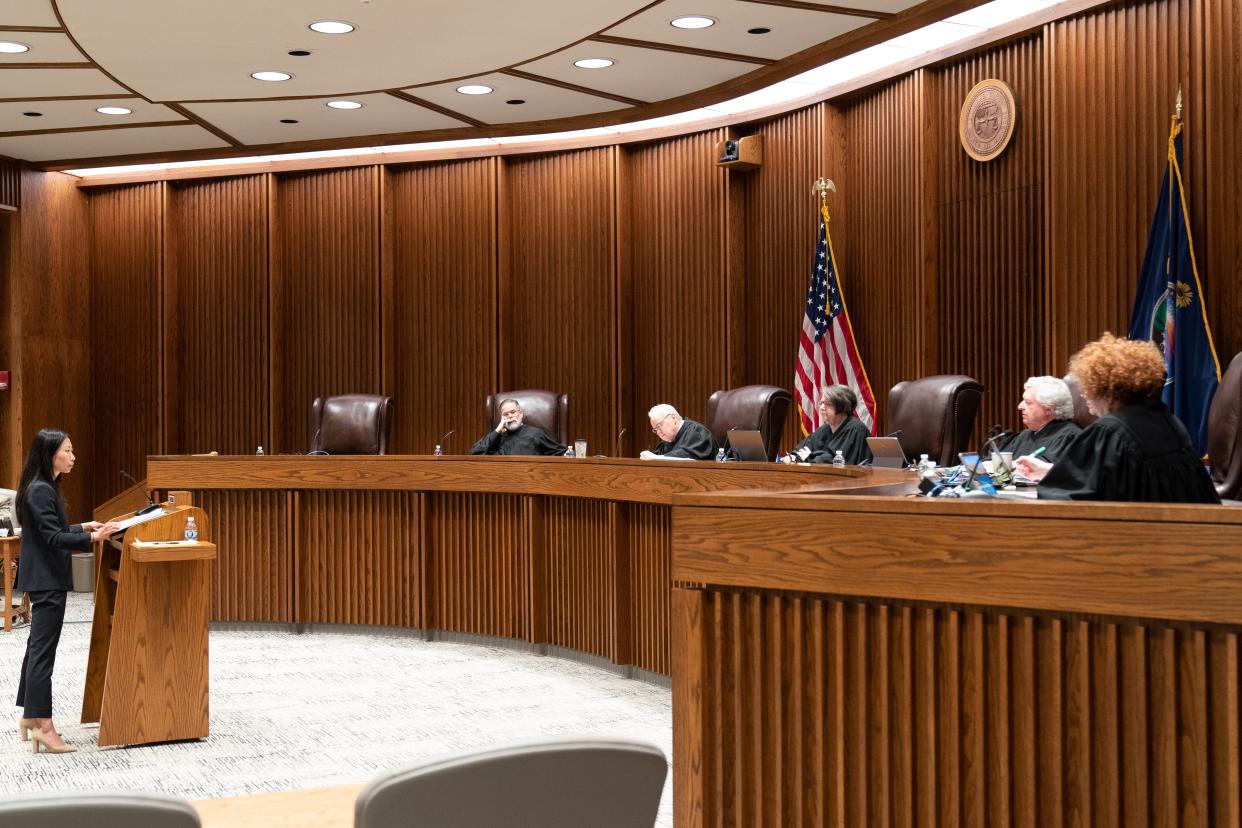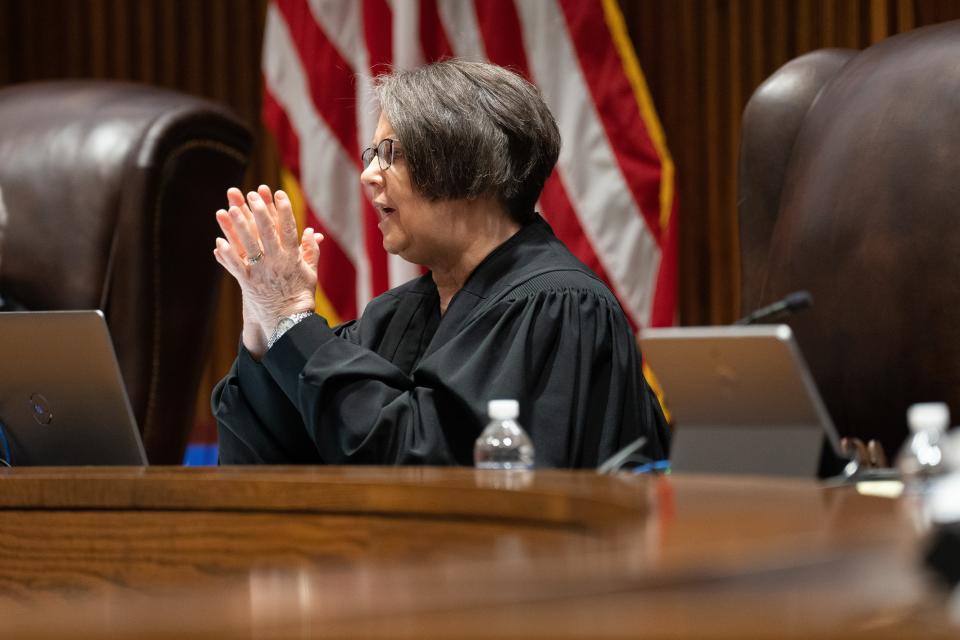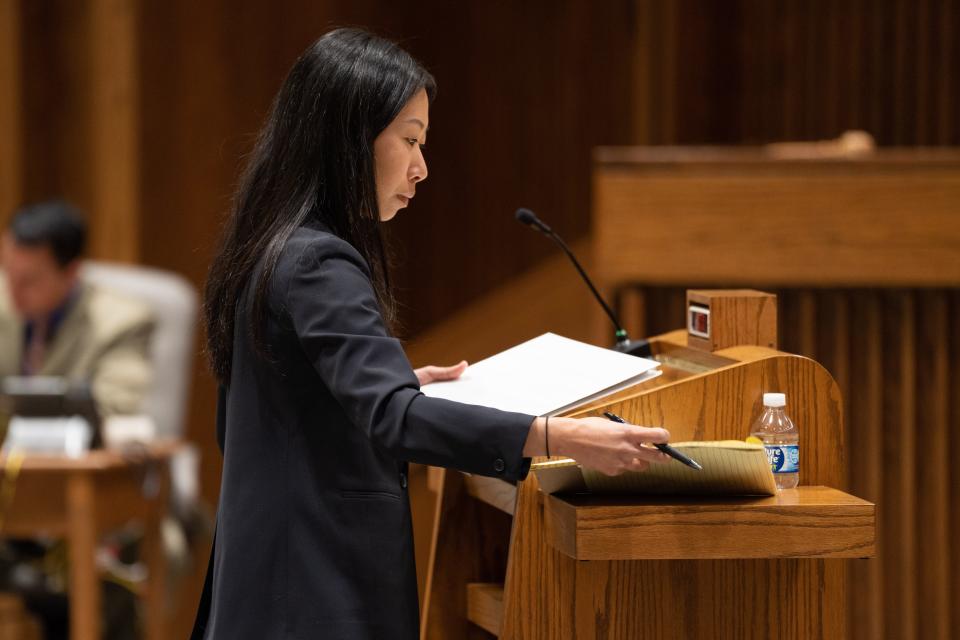Kansas is back in court on abortion rights. How does the August amendment vote factor in?

In arguments before the Kansas Supreme Court on Monday, attorneys and justices clashed over the impact Kansans' rejection of a proposed amendment to erode state constitutional abortion protections should have on two long-running and hotly contested cases related to abortion rights.
The court signaled it is unlikely to overturn their landmark ruling that the Kansas Constitution protects a right to an abortion, and which prompted the August abortion fight.
But the rulings in both cases could have a major impact on abortion rights in Kansas, even in the wake of the amendment vote.
More:Kansas abortion clinics are highly regulated. Will access change in the future?
Solicitor General Anthony Powell argued the vote should be disregarded, saying "I’m not sure we can really say" whether voters were affirming the high court's abortion rulings when they went to the polls in August.
"As a matter of law, constitutional interpretation, the public vote doesn’t matter, particularly when the constitution doesn’t change," Powell said.

Some of the justices disagreed, however, with Powell undergoing over an hour of stiff questioning on the matter.
Justice Dan Biles pointed to language in the U.S. Supreme Court ruling overturning Roe v. Wade arguing voters should weigh in on the issue of abortion.
"We’ve done that in Kansas," Biles said. "We had a vote in August, and pretty overwhelming, to reject the prospect of amending the constitution. I think that is the elephant in the room."
One of the cases at issue is a continuation of the 2019 ruling, where the court issued its landmark decision, which also means any restrictions on the practice must past a higher legal standard.
Using that mandate, Shawnee County District Court Judge Teresa Watson struck down the law at issue, a 2015 measure banning dilation and evacuation abortions, a common second-trimester procedure, as there was not a safe alternative for abortion procedures in that time period.
In 2011, meanwhile, clinics challenged a new set of health and safety standards passed by the Legislature, though those regulations were never enforced as the matter drifted into the courts.
That law includes a requirement that a medical professional be in the room when abortion medications are administered, mandates a post-procedure recover time and requires facilities disclose the firm they contract with to remove medical waste, a standard clinics say would chase away potential companies they could do business with.
In December 2021, Shawnee County District Court Judge Mary Christopher also struck down the restrictions as overly burdensome and that the state's abortion clinics had operated effectively since the regulations were initially blocked, with no safety issues raised.
August amendment vote takes center stage in arguments
It took mere minutes for the court to broach the August abortion vote.
Powell said he felt the voters resoundingly said they did not want to ban abortion.
"Fair enough," he said.
But he also pointed to arguments from opponents of the amendments that Kansas had reasonable restrictions on abortion and argued that the dilation and evacuation ban was furthering that effort.
He said the 2019 ruling undermined public trust in the judiciary and that "there are some issues, and I think abortion is one of them, that cannot be settled by judicial fiat."
"You’ve got to let the people work that out," Powell said.

But Chief Justice Marla Luckert pushed back, arguing that two avenues are available as a check on the judiciary: legislation and constitutional amendments.
"That was what was played out in August. That was the opportunity and I don't know there is a cap on that opportunity," she said.
Powell acknowledged the potential for another abortion vote, saying, "It wouldn’t surprise me" if the matter was put before Kansans again.
Justices appeared skeptical of Powell's argument that the state had a compelling interest in banning dilation and evacuation abortions, with the solicitor general arguing they were "inhumane." Protecting the right to human life, he argued, was sufficient government interest for the law.
"I think dismembering a human being is a horrible thing," he said. "It is a horrible thing to dismember an inmate on death row. It is a horrible thing to dismember a pet."
But Justice Eric Rosen argued there was no evidence introduced in the case to support that point, a fact Powell appeared to acknowledge by saying, "It is hard to give you good evidence."

Alice Wang, the attorney representing a Johnson County abortion clinic, said the court should affirm its prior ruling on abortion.
"The court found these rights belong to all Kansans and that Kansans do not relinquish those rights when they become pregnant," she said.
But Powell maintained the argument that the 2019 decision was improper, arguing that by the logic of that ruling all government regulations on issues such as vaccine mandates should have to meet a higher level of judicial review.
"I guess I’m wondering, is this court then prepared to apply strict scrutiny to all those areas of personal autonomy that government regulates," he said.
Kansas abortion clinic safety regulations also at issue
In arguing in favor of the health and safety regulations, Powell said the restrictions were necessary because abortion deserves a higher level of regulation than other procedures because it involves taking a life. He pointed to a series of high-profile cases where abortion providers lost their medical licenses for unsanitary or unbecoming actions.
The regulations, he argued, would not actually impair the right to an abortion, even though clinics have argued they would be forced to close under the regulatory framework.
"We want to ensure physicians that perform procedures are doing them properly and with the utmost safety in mind," Powell said.
But Caroline Sacerdote, representing the abortion provider in the case, said the restrictions single out clinics but not similar practices that handle miscarriages and other medical fields.
There was, she added, no evidence presented that the regulations would improve the safety of women.
"Our issue is they target the fundamental right for unique restriction and there is absolutely no evidence that the restriction is warranted," she said.
Justice Caleb Stegall, the principle conservative justice on the bench, pressed Sacerdote on if the court must also apply a higher level of review to other conditions that implicate a right to bodily autonomy, the right cited by the high court in the 2019 ruling.
"Can you distinguish abortion and plastic surgery in a legal sense under Article 1 (of the Kansas Constitution)?" Stegall said.
The August amendment vote was less critical to arguments in the second case.
But even though its legal implications might be limited, Sacerdote said the vote still should send a clear message as the state once again waits for a key set of rulings on abortion.
"I would say Kansans' overwhelming rejection of that amendment doesn't directly bear on the legal question before the court today," Sacerdote told reporters following the hearing. "But it does undermine the argument that the 2019 decision recognizing the right to an abortion as fundamental is out of step with the will of Kansans."
This article originally appeared on Topeka Capital-Journal: Kansas abortion amendment vote takes center stage amid key court cases

